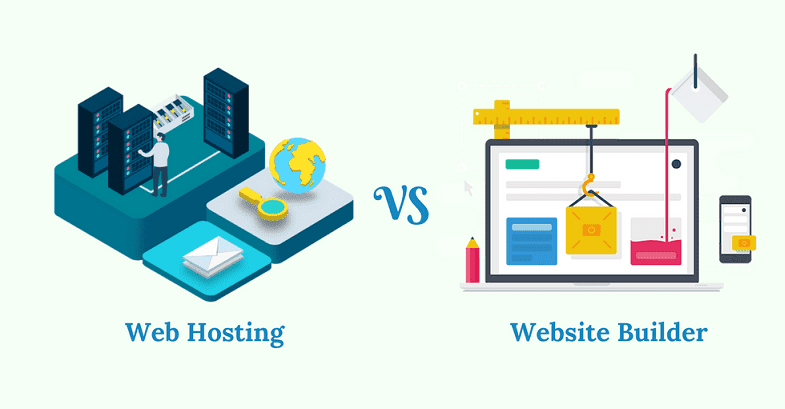
Website Builder vs Web Hosting
To establish a website, one typically employs web hosting and website builders. Although both are essential, only one is indispensable; the other constitutes an additional step in the website creation process.
For those without coding knowledge, an all-in-one platform known as a website builder facilitates the development and publication of web pages. Conversely, web hosting is a service that stores a user’s website files on a server, enabling online accessibility.
To avoid confusion between website builders and web hosting, this article will delve into the features, pricing, customization options, and scalability of both. Additionally, we’ll guide you on making an informed decision between these two services. If you’re keen to learn more, please continue reading.

Table of Contents
WHAT IS WEBSITE BUILDER?
By employing website builders, individuals can create web pages without the need for coding skills. To facilitate the web creation process, these platforms typically offer drag-and-drop functionality and a range of customizable HTML5 templates.
Moreover, leading web builders often come with integrated web hosting services, allowing users to showcase their web pages online without the need for separate hosting purchases.
Due to their user-friendly interfaces and minimal learning curve, web builders are ideal for beginners. Various platforms, such as Squarespace and Wix, offer different features and pricing options to cater to diverse needs.
WHAT IS WEB HOSTING?
The service enabling online access to your website is referred to as web hosting.
While it is technically feasible to publish a website without a web server, it is generally discouraged due to the expensive and time-consuming setup required for a local computer to function as a hosting server.
Web hosting companies simplify the process of publishing websites, providing an easy and widely adopted solution. When customers acquire this service, they essentially rent server space from the hosting company to store their website data. Subsequently, the host server is responsible for handling requests from online users and retrieving the necessary information to display the website.
It’s important to note that a web hosting provider alone cannot be utilized to develop a website, unlike builder platforms. Users have two options: they can either utilize a content management system (CMS) like WordPress or manually create the website and submit its contents to the host server.
Various web hosting firms offer a range of hosting services, providing customers with options such as:
SHARED HOSTING: Multiple users share server resources for their websites, making it the most budget-friendly choice, particularly suitable for small to medium-sized.
CLOUD HOSTING: Rather than relying on a single physical server, a website is hosted across multiple cloud servers. Cloud hosting is advantageous for web applications or sites with high traffic volume.
VIRTUAL PRIVATE SERVERS (VPS): Users are allocated a portion of a physical server’s dedicated resources in VPS hosting. This option is ideal for The owners seeking flexibility and control over their server configuration.
WORDPRESS HOSTING: Tailored for optimal compatibility with the WordPress content management system, this type of web hosting often comes with pre-installed plugins such as LiteSpeed Cache.
FEATURES OF WEB HOSTING VS. WEBSITE BUILDER
Web builders often come with an integrated web hosting service, resulting in comparable functionalities. These include features such as professional email, free and unlimited SSL certificates, a personalized domain, and round-the-clock customer support.
Furthermore, web builders enhance the creation process by offering additional features and functionalities. Some builders establish connections with third-party programs like Hotjar and Google Analytics.
The inherent capabilities of various builders vary based on the platform provider. Web builders may incorporate tools for search engine optimization (SEO), eCommerce features, and AI-powered tools such as the AI Heatmap.
In contrast, web hosting provides greater flexibility, allowing users to utilize a content management system (CMS) like WordPress or custom-code their websites. While CMS usage is facilitated by installing plugins, custom-coded websites require manual development of functionality.
For websites with complex or customized features, investing in a web hosting service is often a preferable choice due to its versatility. On the other hand, websites such as blogs, personal portfolios, company websites, or small online stores can greatly benefit from the convenience of a web builder.
WEBSITE BUILDERS VS. WEB HOSTING: CUSTOMIZABILITY AND DESIGN
Site builders offer templates with pre-installed navigation links, headers, buttons, and other features, easily customizable through a drag-and-drop visual editor.
Despite their user-friendly nature, site builders present a more limited selection of templates compared to content management systems (CMSs), and customization options for bespoke elements are restricted. However, some site builders, like the AI Builder, provide a unique feature by generating an entire based on a brief description.
In contrast, web hosting companies provide greater flexibility in the creation. Utilizing a content management system like WordPress opens up access to over 10,000 themes in its official library, with additional options available in third-party template markets. Alternatively, one can opt for a custom-coded it created by a web developer, offering endless design customization possibilities for enterprise-level projects due to complete code control.
In summary, a web hosting provider offers more extensive possibilities for personalization and design compared to a builder. Nevertheless, site builders supply ample design tools for those looking to create a basic
CONTROL AND SCALABILITY IN COMPARING WEB HOSTING AND WEBSITE BUILDERS
Users of a web hosting service enjoy the flexibility to access and export their files, enabling optimization strategies such as compressing files for faster loading. Additionally, users can swiftly upgrade to a hosting package with enhanced performance or switch to a different provider.
The capability to modify hosting plans is crucial, especially when anticipating a rise in traffic, requiring unlimited bandwidth, or expanding content storage capacity. This adaptability allows it owners to align their hosting resources with the evolving needs of their site.
In contrast, many builder platforms lack the functionality to export the files, posing challenges for users seeking a seamless transition to another platform.
However, some web builders break this mold by offering hosting services that can be upgraded, accompanied by an export capability. For instance, users of the Builder have the flexibility to transfer their sites to WordPress or opt for higher-performance plans at any time.
In summary, while web hosting services provide it owners with increased control and scalability, some builders offer hosting and migration services with upgrade options, facilitating long-term expansion.
CONCLUTIONS
Web builders, as comprehensive platforms, empower users to create and publish web pages without the need for coding knowledge. Conversely, a web hosting provider uploads the files to a server, making them accessible online.
For small businesses and beginners seeking simplicity and a shorter learning curve, a builder proves advantageous. On the other hand, opting for a web hosting provider becomes more favorable when developing a with intricate features and customized code.
webhosting Hyderabad stands as a reliable domain, web security, and web hosting provider, boasting 99.9% uptime, 24/7 support, and high scalability and performance. If you have any doubts, queries, or feedback regarding this article, please feel free to share them in the comments section below.

